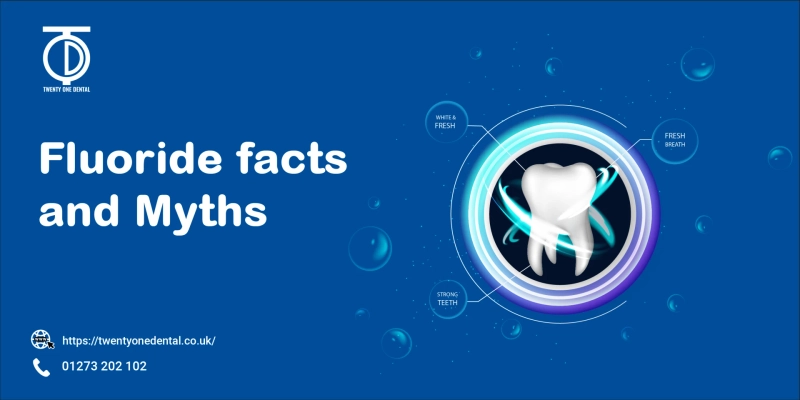Fluoride is a topic that often sparks debate and confusion in the world of dental care. While it has proven benefits for oral health, there are also numerous myths and misconceptions surrounding this essential mineral. In this blog, through the expertise of a Hove Dental Clinic, we'll explore the facts and debunk some common fluoride myths to help you make informed decisions about your oral health.
Fact #1 Fluoride Is Naturally Occurring
One of the most fundamental facts about fluoride is that it occurs naturally in the Earth's crust and can be found in various water sources. In some areas, the natural fluoride levels are not sufficient to provide optimal dental benefits, leading to the introduction of community water fluoridation programs. These programs adjust fluoride levels to the recommended range, promoting better oral health for the entire community.
Myth #1: Fluoride Is Harmful in Any Amount
One common myth is that any amount of fluoride is harmful. In reality, the fluoride levels recommended for community water fluoridation are carefully controlled to provide dental benefits while minimizing any potential risks. Extensive research and monitoring have shown that when used within established guidelines, fluoride is safe and effective.
Fact #2: Fluoride Strengthens Tooth Enamel
Fluoride works by strengthening tooth enamel, making it more resistant to acid attacks from plaque bacteria and sugary foods and beverages. This remineralization process helps prevent tooth decay and cavities. Dentists in Hove, suggest that fluoride will work effectively if done with supervision of a professional or with apt knowledge.
Myth #2: Fluoride Can Weaken Bones and Cause Health Problems
Another myth suggests that fluoride can weaken bones and lead to various health issues. This misconception often arises from studies conducted in areas with naturally high fluoride levels in drinking water, far exceeding recommended levels. When fluoride levels are controlled, as in community water fluoridation, the risk of bone issues is negligible, and the benefits to oral health far outweigh any potential concerns.
Fact #3: Fluoride Toothpaste Is Safe and Effective
Fluoride toothpaste is a widely recommended and safe tool for maintaining good oral health. It helps strengthen tooth enamel, prevent cavities, and reduce the risk of gum disease. The American Dental Association (ADA) and other dental organizations endorse the use of fluoride toothpaste for both children and adults.
Myth #3: Fluoride Toothpaste Is Harmful, Especially for Children
There's a misconception that fluoride toothpaste is harmful, especially for children who might swallow it. While excessive consumption of toothpaste can lead to fluorosis (a cosmetic issue affecting tooth enamel), using the recommended amount of fluoride toothpaste and supervising young children during brushing can prevent this issue. Fluorosis is typically mild and has no impact on oral health.
Fact #4: Fluoride Treatments Are Beneficial
Fluoride treatments offered at dental clinics, such as varnishes and gels, are highly effective in preventing tooth decay, especially in high-risk individuals. Dentists often recommend these treatments for children, seniors, and those with specific dental conditions.
Myth #4: Fluoride Treatments Are Unnecessary
Some people believe that fluoride treatments are unnecessary if they use fluoride toothpaste. While fluoride toothpaste is essential, fluoride treatments can provide an extra layer of protection, particularly for those at higher risk of cavities.
Fact #5: Fluoride's Impact on Children's Dental Health
Fluoride plays a crucial role in improving children's dental health. It not only strengthens developing teeth but also makes them more resistant to cavities. Community water fluoridation and fluoride treatments at dental visits significantly contribute to reducing childhood tooth decay. One should not do so when they have just got their Teeth Straightening treatment done.
Myth #5: Fluoride Is Ineffective in Preventing Tooth Decay
Contrary to this myth, fluoride has been extensively studied and proven effective in preventing tooth decay. Numerous studies and real-world applications have consistently demonstrated its benefits in reducing cavities and maintaining oral health.
Fact #6: Fluoride Is Widely Endorsed by Dental Associations
Leading dental organizations worldwide, including the ADA, World Health Organization (WHO), and the Centers for Disease Control and Prevention (CDC), endorse the use of fluoride for its undeniable role in promoting oral health.
Myth #6: There's a Conspiracy Around Fluoride
Some conspiracy theories suggest that there's a hidden agenda behind fluoride use. These claims are not supported by scientific evidence. The endorsement of fluoride by reputable dental and health organizations is based on extensive research and decades of practical experience.
Embracing the Benefits of Fluoride
In the increased concerns of oral health, fluoride is a proven ally in the fight against cavities and tooth decay. While myths and misconceptions about fluoride persist, the scientific consensus is clear: when used responsibly and within established guidelines, fluoride is safe and highly effective.
Don't be swayed by misinformation. Embrace the benefits of fluoride by maintaining good oral hygiene practices, using fluoride toothpaste, and considering fluoride treatments when recommended by your dentist. By understanding the facts and dispelling the myths surrounding fluoride, you can make informed choices that contribute to a healthier, happier smile.
If you have any questions or concerns about fluoride and its role in your oral health, consult your dentist or TwentyOne Dental with best dental implant specialists in Brighton, for personalized guidance and recommendations tailored to your specific needs.



